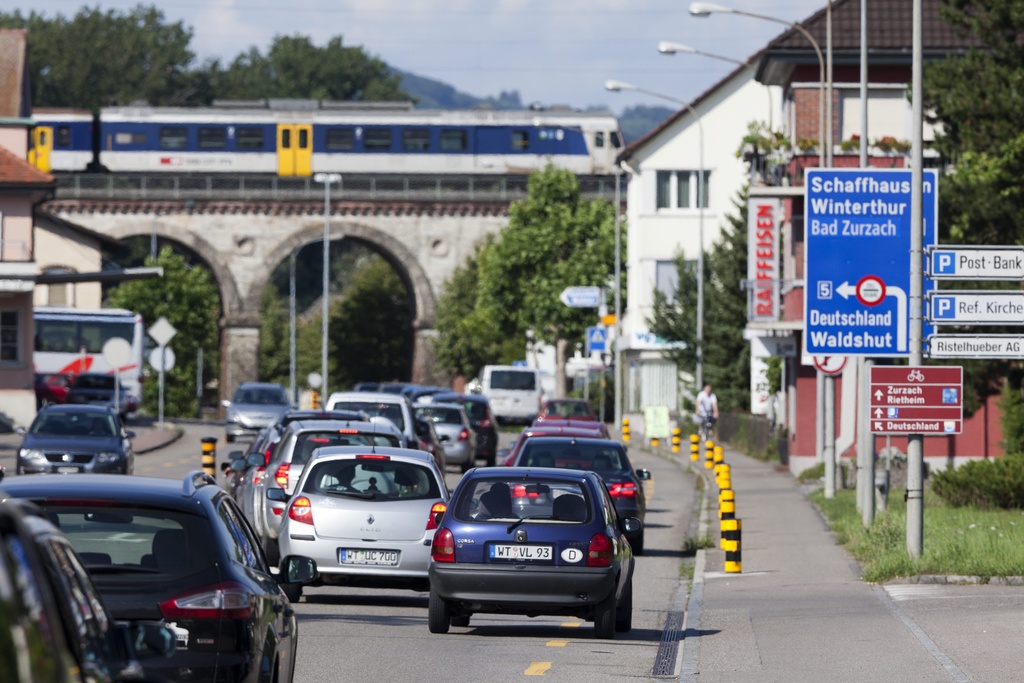Cross-border workers on the rise

Growing numbers of people are crossing the border daily to work in Switzerland, spurred on by the eurozone crisis and the relatively stable Swiss job market.
The number of workers from France, Germany, Italy and Austria has gone up by a third over the past five years. In the course of 2011 the number rose even faster, by 11.5 per cent.
Since 2006 there has been an upsurge in the number of cross-border workers doing office and managerial work, or working as unskilled labourers, according to figures released by the Federal Statistics Office on Monday.
The figures refer only to foreign nationals, not to Swiss citizens who live on the other side of the border and also commute across it every day.
Last year, the 259,000 cross-border workers accounted for around five per cent of Switzerland’s working population.
The majority of these commuters were aged between 25 and 49, and approximately 64 per cent were men. Forty per cent worked in the industrial sector and almost 60 per cent in the service sector. Fewer than one per cent were employed in agriculture.
The vast majority of them were salaried employees: only 2,000 worked independently.
French residents make up the biggest group: over 136,000 at the end of 2011. This number was up by 77 per cent since 2006. Nearly 60,000 arrive from Italy every day, while more than 54,000 make the trip daily from Germany.
Nearly 80 per cent of these workers are employed in just three regions: around a third in the Lake Geneva area, just over a quarter in northwestern Switzerland and one fifth in the southern canton of Ticino. In Ticino they represent nearly a quarter of the workforce, whereas they account for about one worker in ten in the other two regions.
“Win-win situation”
George Sheldon, a professor of labour economics at Basel University, told swissinfo.ch that cross-border workers were an easy solution to the problem of filling job vacancies.
“Recruitment of foreign workers is definitely demand driven here in Switzerland. You can’t get a work permit if there isn’t an opening. In that sense I don’t think it can have a negative effect,” he explained.
“The only negative effect you could have is if people immigrate and they are suddenly not needed anymore. But cross-border workers don’t immigrate. So I think it’s a pretty safe thing.”
“If you assume they are needed as you can’t fill the openings otherwise, and when you don’t need them anymore, they go home, that must be a win-win situation to my mind.”
Economic attraction
Switzerland’s working population grew by 8.8 per cent to 4.73 million between 2006 and 2011. The growth in cross-border workers in general followed the availability of jobs.
Switzerland’s comparative economic stability amid the global economic slowdown has been a factor in attracting more job seekers.
“Above all the increase is a result of the Swiss economy and its prosperity. The economy needs new manpower in order to progress and outshine neighbouring economies,” Michel Charrat, head of the non-profit European group which represents workers crossing the French and Swiss border, told Swiss radio.
“The eurozone crisis also has something to do with it, because in today’s labour market you have the free movement of people, and the job market can recruit cross-border workers from further and further away, depending on their skills and abilities.”
Charrat said his group’s main concern was that cross-border workers were mainly given short-term contracts, particularly in the watchmaking industry.
He noted also that there was growing pressure on housing on the French side of the border, not only from French people who had moved there to take advantage of the chance of working in Switzerland, but also from Swiss who cannot find anywhere to live at home.
The State Secretariat for Economic Affairs (Seco) said it was studying the rise in cross-border commuting, and “there will definitely be something about it” in its next annual report on the job market, which is published in May.
There are currently 259,000 non-Swiss citizens crossing the border to work in Switzerland daily.
The number was up by 11.5 per cent at the end of 2011 in comparison with 2010, a faster rise than in the two preceding years.
In 2009 the increase over the year was only 2.4 per cent, and in 2010 it was 4.8 per cent.
In general, the number of cross-border workers increases when the number of jobs increases.
The increase over the year varies considerably according to the type of job.
Cross-border workers are over-represented in lower qualified jobs, and under-represented in intellectual and scientific jobs.
In 2011 just over half of them – 52.7 per cent – were resident in France, while 22.8 per cent came from Italy, 21.1 per cent from Germany, and 3.2 per cent from Austria.

In compliance with the JTI standards
More: SWI swissinfo.ch certified by the Journalism Trust Initiative













You can find an overview of ongoing debates with our journalists here . Please join us!
If you want to start a conversation about a topic raised in this article or want to report factual errors, email us at english@swissinfo.ch.